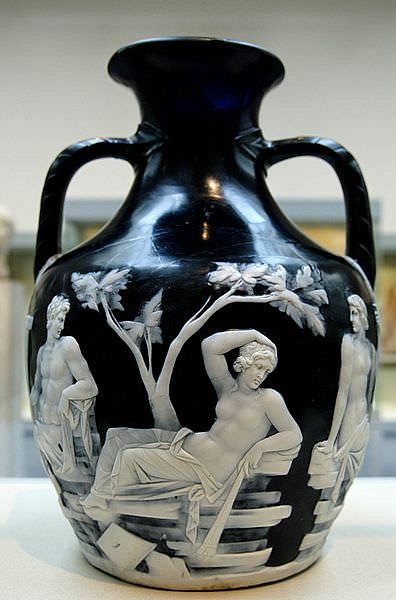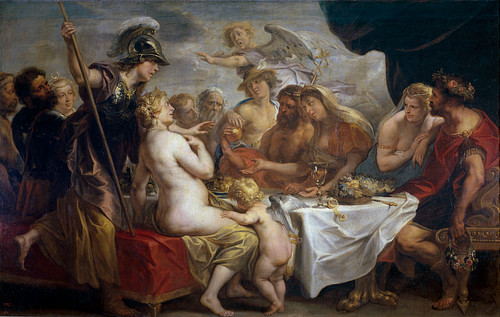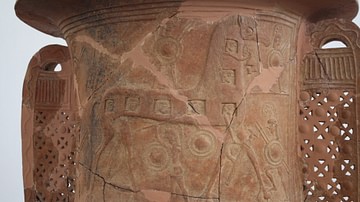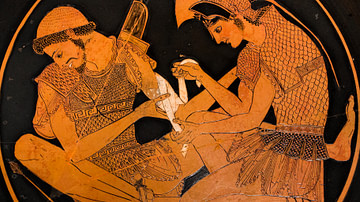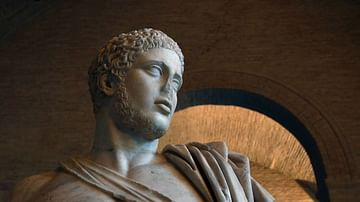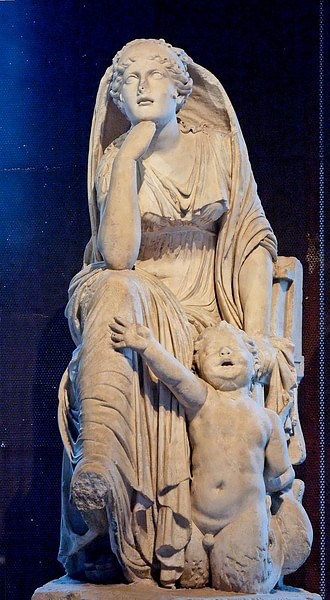
Thetis is one of 50 Nereids (sea nymphs) and a goddess of the sea in Greek mythology. Thetis is best known for being the mother of the Greek hero Achilles, however, her role goes beyond that; she appears in various stories and interacts with multiple gods and goddesses, often caring for gods and heroes in need.
Described as fair-haired and silver-footed, Thetis was the most prominent of the Nereids (alongside Amphitrite), with the power to transform into different forms. Her wedding to King Peleus was the most splendid in Greek mythology and was part of the catalyst for the Trojan War.
Birth & Family
According to Hesiod (c. 700 BCE) in his Theogony, Thetis was one of 50 beautiful Nereids born to Nereus, the Old Man of the Sea and Doris (a sea goddess).
And Nereus and Doris, lovely-haired
Daughter of Oceanus, circling stream,
Begot and bore, in the unfruitful sea,
Their children, most beloved of goddesses:
Protho, Ukraine, Sao, Amphitrite,
Eudore, Thetis, Galene, Glauce, and
Cymothoe, Speio, and quick Thalia.(Hesiod, Theogony, 242-248)
The Nereids were beautiful sea nymphs who personified the specific elements of the sea. They lived on the bottom of the sea in caverns and were seated on golden thrones. They glided through the water and danced on the shores. The Nereids were part of Poseidon's underwater royal procession, along with other sea deities and creatures.
Multiple sources, such as the Iliad by Homer (c. 750 BCE) and the Argonautica by Apollonius of Rhodes (c. 295 BCE), mention that Hera raised Thetis.
Thetis, the Helpful Goddess
Thetis and the Nereids were known to assist some notable Greek mythological figures. On the orders of Hera, they helped Jason and the Argonauts by guiding their ship to safety when they sailed near the fearsome sea monsters Charybdis and Scylla and the imposing Wandering Rocks.
Hephaestus was neglected and thrown off Mount Olympus by his mother, Hera, for being weak and sickly. He landed in the sea, where Thetis and the Nereids rescued him. They treated him with compassion and kindness, so he stayed with them for years, mastering his metalworking skills and making items for the Nereids to thank them for their hospitality. After nine years had passed, Thetis came across Hera, who admired the brooch she was wearing. She was pleasantly surprised to learn that Hephaestus had made it for Thetis and ordered him to return to Mount Olympus, where he made weapons for the gods.
Thetis also took care of Dionysos after King Lycurgus of Thrace attacked him and his followers (the Maenads). King Lycurgus pursued Dionysos and his followers down Mount Nysa until they dove into the sea. Thetis embraced a terrified Dionysos and kept him and his followers safe. The gods took revenge upon King Lycurgus by striking him blind.
Some of the Olympian gods, namely Hera, Poseidon and Athena, conspired against Zeus and succeeded in binding and trapping him. Out of all the gods and goddesses, Thetis was the only one who rushed to rescue Zeus and release him from his chains. She summoned the hundred-handed monster, Briareus (Aegaeon) from Tartarus, who stormed Mount Olympus and instilled great fear in the immortals, stopping them from attempting any further attacks against Zeus.
Thetis & King Peleus
Zeus and Poseidon had both competed for Thetis' hand in marriage. Poseidon believed that as a sea nymph, she would make the ideal queen of the seas. However, thoughts of marriage swiftly left their minds after Themis, the goddess of divine law, prophesied that Thetis would have a son who would be more famous and brave than his father. Some sources state that Prometheus told Zeus this. Others mention that Thetis was reluctant to sleep with Zeus because Hera had raised her. As punishment, Zeus ordered her to marry a mortal.
King Peleus of Phthia knew where Thetis and the Nereids danced on the shore and lay in wait for her. Once she appeared, he grabbed her and kept a firm hold on her as she turned into fire, a lion, a bird, and a tree in a desperate attempt to escape from him. However, King Peleus refused to let go of her until she transformed back into her human form. Thetis realised that she was powerless and agreed to marry him.
Their wedding was held on Mount Pelion in Thessaly. Hera arranged for them to have the most brilliant wedding as a sign of gratitude towards Thetis for not sleeping with Zeus. There was singing and feasting with all the gods and goddesses present, except for one – Eris, the goddess of strife and discord. In anger, Eris threw her Golden Apple of Discord with the inscription "to the fairest" into the crowd, which ultimately led to the actions that were the catalyst for the Trojan War.
Thetis & Achilles
Thetis gave birth to Achilles and wanted to make him immortal. The most famous retelling has Thetis holding Achilles by the heel and dipping him into the River Styx, causing his heel to become his only vulnerable spot. Other sources state that she buried him in the fire at night to burn the human element out of him while she rubbed the baby with ambrosia during the day. Peleus caught Thetis trying to make Achilles immortal and put a stop to it. Growing frustrated, she returned to the Nereids. After Thetis deserted Achilles, Peleus entrusted his care to the wise centaur, Chiron.
Once the Trojan War began, Thetis knew that Achilles would not return from Troy if he went to fight. Desperate to save his life, she disguised him as a woman and sent him to King Lycomedes of Skyros. After Achilles inevitably joined the Greek army, she called in favours from various gods, trying to prolong his life. When Achilles' lover, Briseis, was taken away by King Agamemnon and his men, Achilles asked Thetis to help him take revenge on Agamemnon. Thetis went to Zeus, who owed her a favour and begged him to assist her son.
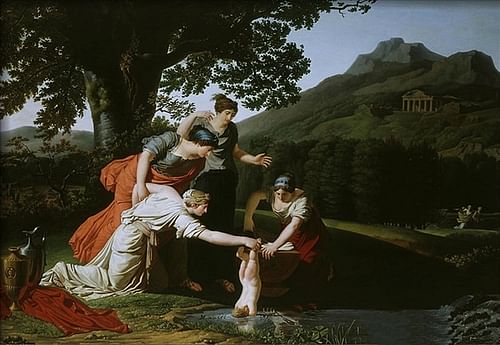
Zeus, Father Zeus! If I ever served you well
among the deathless gods with a word or action,
bring this prayer to pass: honour my son Achilles! –
doomed to the shortest life of any man on earth.
And now the lord of men Agamemnon has disgraced him,
seizes and keeps his prize, tears her away himself. But you –
exalt him, Olympian Zeus: your urgings rule the world!
Come, grant the Trojans victory after victory
till the Achaeans pay my dear son back. (Iliad, 1. 600-609)
Zeus agreed to help turn the tide of victory in the Trojans' favour, much to the annoyance of Hera. After Patroclus' death, Thetis and the Nereids came to shore, worried about Achilles. Thetis comforted her son and warned him that if he killed Hector to avenge Patroclus, his own death would soon follow. However, she understood his need to avenge his beloved Patroclus. So she promised to get Hephaestus to make him a new suit of armour since Hector had his. Hephaestus was only too happy to help Thetis, remembering fondly how well she and her sisters had treated him.
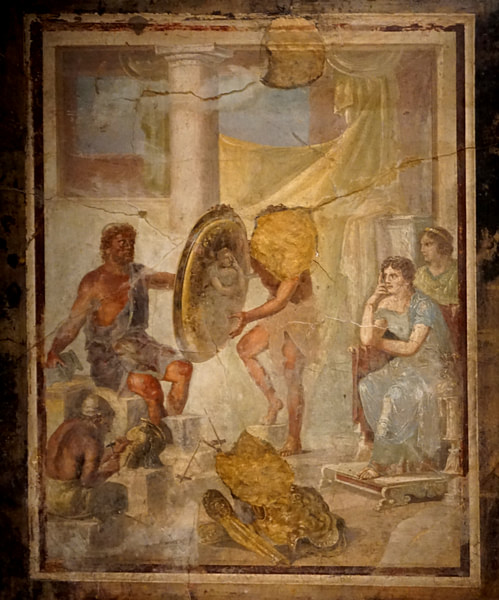
Thetis took the magnificent suit of armour to Achilles and promised to watch over Patroclus' body while he went to fight. She gave her son courage and instilled ambrosia and blood-red nectar in Patroclus to make his skin firm. After Hector was killed and Achilles took possession of his body, Zeus called Thetis to Mount Olympus and gave her a message for her son. Thetis advised her son to return Hector's body to the Trojans as the gods were angry with him. After Achilles died, Thetis left Peleus.
Worship & Legacy
The Nereids have an Orphic hymn dedicated to them, praising their beauty and purity. The speaker invokes them to bring prosperity to the initiates, as they were the first to practice the holy rites of Bacchus.
In his Description of Greece, Pausanias (c. 115 to c. 180 CE) mentions that there are altars dedicated to the Nereids throughout Greece and holy ground consecrated to them on foreshores where Achilles is also honoured. In Sparta, a sanctuary was dedicated to Thetis after Cleo, a priestess of Thetis, was taken hostage. A wooden image of Thetis was also kept under guard. On the island of Cranae, an image of Thetis was erected near the sanctuary of Aphrodite Migonitis by King Menelaus of Sparta after he had returned safely from the Trojan War.
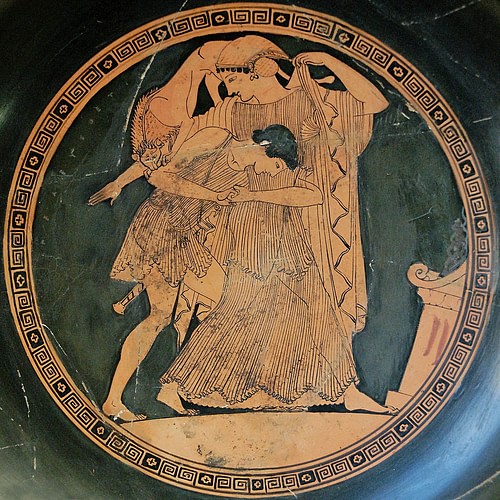
In Herodotus' (c. 484-425/413 BCE) Histories, during the Greco-Persian Wars (5th century BCE), a great storm blew up and destroyed 400 ships in the Persian fleet. The storm was brought to an end by the Persian Magi after they had made offerings to Thetis and the Nereids. They honoured Thetis because they learnt that where they had taken refuge was the same place where Peleus had carried her off and was, therefore, a sacred place to her. Their offerings seemed to have worked as the storm soon ended.
Thetis is featured in the movies Clash of the Titans (1981), where she is portrayed by the highly esteemed English actress Maggie Smith and in Troy (2004) by the British actress Julie Christie. She is also a character in the much-loved book The Song of Achilles (2011) by Madeline Miller, in which Thetis disapproves of the relationship between Achilles and Patroclus and tries to keep them apart.

